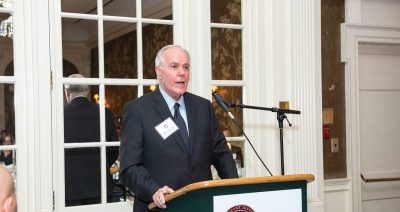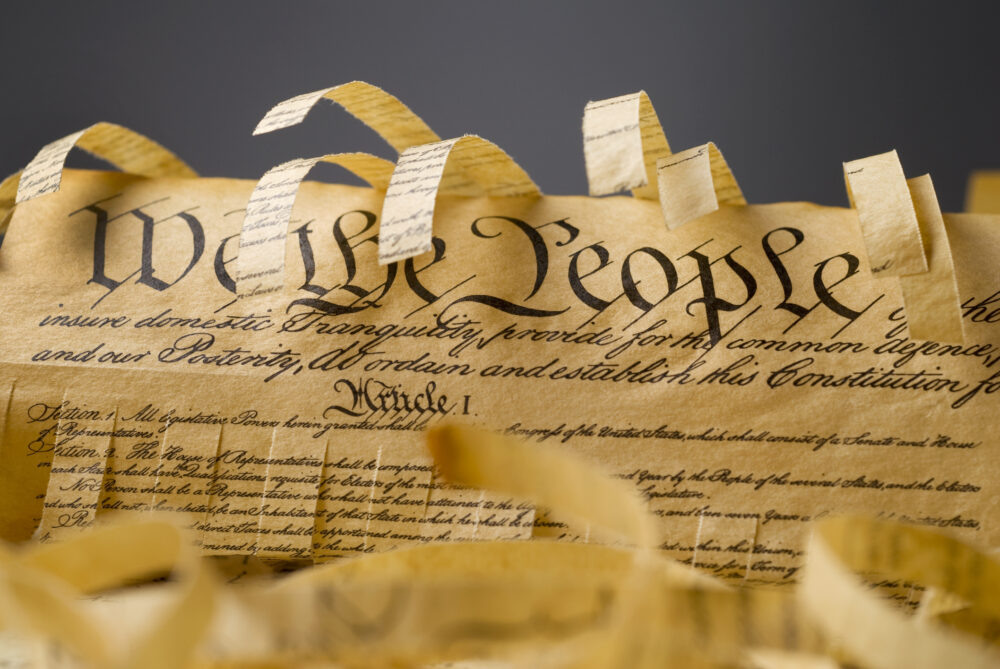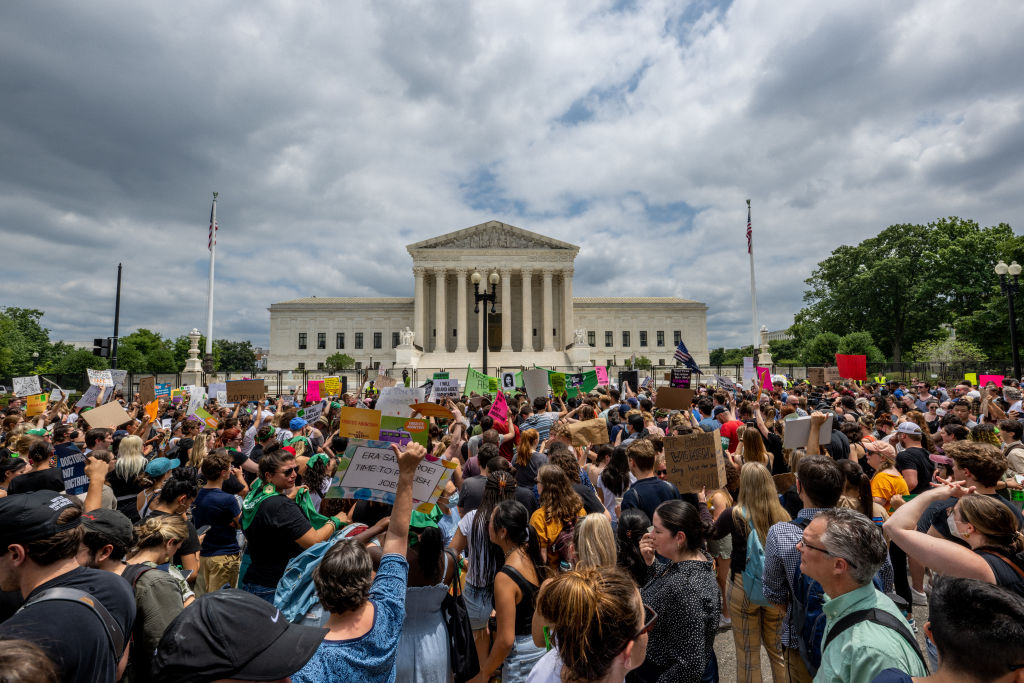The widespread loss of trust in America’s fighting force is warranted.
The Struggle Ahead

Remarks accepting the Claremont Institute’s Henry Salvatori Prize in the American Founding, Washington, D.C., October 27, 2018.
Thank you, Ryan, for your generous remarks. My thanks, too, to the board of the Claremont Institute for their kindness in bestowing this award upon me. It is a pleasure and a privilege to be associated with all of you.
Anyone who tells you he doesn’t enjoy hearing his virtues being lied about isn’t telling the truth. Encomia of the sort you just heard are usually reserved for wakes, where the corpse, while present, isn’t expected to say anything. Tonight will be different. I tried to beg off when informed that the board had awarded the Salvatori Prize to me. I changed my mind upon learning that the winner was required to make a speech. Now you’re stuck. Get over it.
The serendipity of this award confirms how richly blessed my life has been from the very beginning. By the grace of God, I chose the right parents, who operated on the assumption that their sons should be approximately perfect. Or else. For equally undeserved reasons, a patient and cheerful order of nuns directed my nearly schooling. Like my parents, they believed that they were placed on this earth to remediate, insofar as possible, the consequences of fallen nature. These wonderful women were particularly adept at converting the mischievous energy of boys into something almost respectable. For all of that, and to all of them, I am more grateful than I can say.
My good fortune did not end there. Virtually all of my subsequent education—secondary school, then college, law school, and graduate school—was made possible through the generosity of men who, before Progressives started calling them malefactors of great wealth, used to be known as captains of industry—the kind of men who took pride in making America the arsenal of democracy. The first such beneficence came my way courtesy of P.R. Mallory, a gentleman of the old school who also happened to be a brilliant engineer. His ingenuity more or less revolutionized the longevity of batteries just in time to help our submariners win World War II. The company he founded is known to all of you today as Duracell.
The descendant of an old and famous seafaring family, Mr. Mallory, among other things, twice served as the president of the New York Yacht Club—back in the day when service in that then exalted position came with the privilege of underwriting the Club’s annual deficit. He also underwrote—anonymously—my secondary education at one of America’s great independent schools. His greatest philanthropic legacy, however, lay in midwifing the rebirth of Mystic Seaport, in Connecticut, where he served for many years as president of its museum. (If you haven’t been there, be sure to go. When you do, bring your children. But before you leave, a tip of the hat, please, to P.R. Mallory, whose generous spirit still inhabits the place.)
Mallory’s interest in whaling and sailing was not merely nautical. He was a close student of, and spoke often (even to a teenaged ignoramus like me) about the history of seafaring and the connection between sea power and American freedom. His sentiments on that subject would have been enthusiastically seconded by another generous and grateful American, albeit a landlubber, the man who created the prize I am honored to receive tonight. In contrast to Mallory, who was, so to speak, to the manor born, Henry Salvatori was raised on a farm in his native Italy, and, after coming to America, in New Jersey. Like Mallory, he was a highly creative engineer who made significant contributions in his chosen field, in Henry’s case, to petroleum extraction techniques that are still widely used many decades later. Salvatori believed that the United States was the greatest nation on earth because of its founding principles. Most of his philanthropy sought to ensure that those principles would be understood by and conveyed to succeeding generations of Americans.
I first met Henry almost exactly 50 years ago. I’ve reached the age when almost everything important in my life seems to have happened 50 years ago. Indeed, the wheel has come full circle: I was selected as the first Henry Salvatori Research Fellow while attending the Claremont Graduate School. That brought me into frequent contact with this generous man. To know Henry was to know a man whose courage, keen intellect, and fondness for spirited argument sustained his devotion to our nation’s founding. Fortunately for many American institutions, not least the Claremont Institute, Henry put his money where his principles were. He also dedicated a good deal of his time to practical politics, an endeavor that with one notable exception he performed exceedingly well. (The exception was that, at one point, he had the delusional idea that it might be a good idea if I ran for Congress; but I’ll save that story for another time.)
Among other things, Henry was a significant donor to the national Republican Party as well as to his state party (back in the days when there really was a Republican Party in California). He was Barry Goldwater’s finance chairman in 1964, as well as the premier (and wisest) member of Ronald Reagan’s “kitchen cabinet” long before Reagan achieved political fame. Among other things, it was Henry who convinced Goldwater that Reagan should deliver a televised speech in his behalf during the 1964 campaign. Entitled “A Time for Choosing,” it became an instant classic and catapulted the former actor onto the national political stage. (If you haven’t seen it, do yourself a favor and watch it on YouTube. Apart from a few dated references, it is a speech whose themes still resonate today. And of course, it was delivered with what became Reagan’s trademark panache.) From that moment on, every sentient being knew what Henry had intuited many years before: that Ronald Reagan would soon become a force to be reckoned with. The rest, as they say, is history.
Back in 1967 when Henry and I first met and talked, the country was in the throes of heated, not to say raucous, domestic turmoil, not unlike today. In those days, most of the sound and fury was occasioned by the war in Vietnam. Other forces were at work, to be sure, but their effects were for the time-being quarantined. Although the sexual revolution had been launched, for example, it had not fully eroticized the culture; the sybaritic eruptions of Woodstock were yet a few years away. The same held true for the ideas of thinkers like Herbert Marcuse, Antonio Gramsci, and Saul Alinsky, whose radical ruminations were for the most part celebrated in obscure journals. And while college students, as many adults said at the time, were certainly revolting, their passionate enthusiasms had only partly infected the larger body politic.
All that and more would descend upon the nation in short order.
But in 1967 a rational observer could still believe that American institutions were basically sound and that electoral politics would return to normal once the adults returned from vacation. 1968 saw the election of Richard Nixon, who would be re-elected four years later by one of the largest landslides in American history. His successor, the former nuclear submarine commander, Jimmy Carter, hardly personified the spirit of Woodstock. And after he left the scene, his successor declared to great applause that it was “Morning in America” again.
For a while it was. But following the demise of the Soviet Union (accomplished largely through the courage and determination of President Reagan), we turned our gaze inward. There we discovered, as Hamlet’s mother said, dark and grained spots that would not leave their tinct. While America busied itself in the noble work of taming the Soviet bear, cultural decay had gnawed at the vitals of the civilization that men like Ronald Reagan celebrated and defended so often and so well. The so-called “holiday from history” that began in 1989 with the fall of the Berlin Wall and ended on 9/11 with the fall of the Twin Towers, was not only a wake-up call to redefine American foreign policy. It also laid bare the relativism, now bordering on nihilism, that had infected American political culture, indeed the culture of the entire Western world.
We can see much more clearly now the decadent path on which Western culture had been descending for the better part of the Twentieth Century. To one who reached his maturity in the ‘Fifties, when God was in His heaven and all seemed right with the world, perhaps the most surprising fact is the speed with which cultural decay has undermined seemingly solid institutions. Here is one measure: In the ‘Sixties and ‘Seventies the chant of “Hey, hey, ho, ho, Western Civilization’s got to go” was the more or less exclusive mantra of coddled college students with too much time on their hands and too little in their heads. That same slogan today has infected the bloodstream of the entire Democratic Party, and appears to be the very raison d’etre of its dominant wing. Similar sentiments, mutatis mutandis, are echoed by many liberal interest groups, the professoriate, and the news media. The barbarians, in a word, are not only inside the gates; they are far more numerous, dispersed, and powerful than they once were.
How best to counter this threat is, I believe, the central challenge facing America today. It will be up to you in your diverse capacities to devise relevant solutions. Despite occasional bouts of gloom to which men of my age are prone, I am confident that the collective intellectual energy and moral courage of men and women like you will rise to the occasion. I’ll have a few suggestions to make along these lines momentarily, but before doing so, allow me to dilate just a bit on the constitutional aspects of the crisis now confronting the nation.
First, I think it beyond argument that we do face a genuine crisis, that it is very deep, and that it is essentially moral and intellectual rather than merely political in the narrow sense of that term. I also think that conditions are likely to get worse before we see improvement. But when and if the denouement arrives, I believe the resolution will strain our constitutional order as nothing before. I say this because a significant percentage of the population seems to have lost faith in the foundations of the American constitutional order. That should not be altogether surprising, inasmuch as they have been badly tutored. The loudest and most influential among their instructors have argued for two generations or more that the Founders’ Constitution is not merely mistaken in this or that feature, but is fundamentally flawed, even illegitimate. For many if not most left-wing intellectuals it is seen as an anti-democratic plot foisted upon naïve citizens by corrupt white males. This disposition, once the more or less exclusive property of hot-headed pamphleteers, agitators, and the professoriate, has surfaced increasingly in the rhetoric of prominent public officials, who disparage the Constitution they have taken a solemn oath to protect and defend.
The Constitution of their oath, however, is not the constitution that attracts their loyalty. Their constitution does not derive from the laws of Nature and Nature’s God; and it is certainly not devoted to securing natural rights and limited government. Theirs, rather, is a constitution in thrall to the prospect of perpetual change and ever-expanding government. This view of constitutional things in the United States was born over a century ago in the writings of leading Progressive thinkers and politicians. They set about to alter the foundations of the American regime, and to a remarkable degree they have succeeded. Their teaching dominates schooling at every level, book publishing, the news media, and popular culture. Despite occasional setbacks, the Progressive chattering class seems confident that its agenda will remain in the vanguard of American political culture. The election of Donald Trump, however, and now the prospect of a conservative Supreme Court, appear to have sapped their self-assurance and triggered a heavy bout of “Trump Derangement Syndrome.” Something seems to have gone awry with History’s inexorable march toward a Progressive utopia. That explains, I think, why so many Progressive thinkers and politicians have recently become bolder and nastier in expressing negative opinions about their country.
The nomination hearings for (now) Justice Brett Kavanaugh to the Supreme Court present an instructive case in point.
There was a time not long ago, when all but the most fevered leftist politicians, whatever their private thoughts, would have hesitated to utter such sentiments aloud. Nowadays, they are not only not hesitant; they seem proud to do so, toward the end of undermining a constitutional order they see as an impediment to their agenda. This is where the intellectual and political revolution, launched with high promise and optimism at the turn of the Twentieth Century, has finally brought us: the Constitution is to be honored to the extent, and apparently only to the extent, that it can be manipulated to achieve Progressive ends. When such manipulation fails, the original Constitution must not only be disregarded, but denigrated. That, I believe, is the principal lesson of the Kavanaugh nomination battle. The bitterness it engendered is likely to be with us for a long while. I won’t dwell on details of the Kavanaugh hearings that are probably familiar to most of you here tonight. I will offer three observations, however, that underscore my belief that we are now engaged in a battle for America’s constitutional soul.
First, you will note how little Kavanaugh’s opponents had to say about the merits or demerits of his more than 300 judicial opinions as an appellate judge, or the jurisprudence that informed them. There was good reason for this tactic. His critics knew perfectly well that Judge Kavanaugh could more than hold his own on any important legal subject, and for that reason, they avoided engaging him in a manner likely to enhance his credentials to sit on the High Court. For Kavanaugh’s opponents (including the 2400 professors who signed a letter saying he was unfit to hold office) the nomination fight was only incidentally a debate about differing theories of constitutional interpretation; it was fundamentally a battle about judicial will and power. The hearings reveal, it seems to me, that today’s Progressives have completely internalized the central premise of legal realism and jurisprudential positivism, namely, that the law is what judges say it is. The Progressive constitutional cat, so to speak, is now out of the bag.
Second, although the issue was uppermost in their minds, you will note that Kavanaugh’s opponents studiously avoided engaging in serious public discussion of abortion jurisprudence. While they were unwilling to debate the issue in a public forum, there’s no question, at least to my mind, about the principal cause of the unusual passion that animated the attacks on Judge Kavanaugh’s character. Roe v. Wade and its jurisprudential progeny have become the left’s legal analogue to the Nicene Creed: the more or less authoritative statement of liberal doctrine on the nature of human rights, from which no deviation will be tolerated. Although Judge Kavanaugh had never ruled on an abortion case, suspicion that he might become a fifth vote moving the Court in a pro-life direction became a fire bell in the night. If you seek an explanation for the caterwauling that dominated Judge Kavanaugh’s opponents, I think the answer is to be found there.
Third, there was a particularly noteworthy moment in a hearing filled with many obnoxious but telling moments. It involved Senator Kamala Harris and occurred before Senator Feinstein launched the Christine Ford Missile. During an earlier line of questioning, Judge Kavanaugh revealed that he carried a copy of the Constitution in his pocket—a habit, by the way, followed by many federal judges. Senator Harris took note of Kavanaugh’s habit only to dismiss it with a cynical gesture, referring contemptuously to “that little book you carry.” Senator Harris, it is said, is preparing to launch a presidential campaign. One wonders what book she will rely on as her candidacy advances. This much seems clear: there is no longer room in the Democratic Party for citizens who remain, so to speak, people of Judge Kavanaugh’s book. As to that, Progressives seem to be unusually interested in the physics of what happens at approximately 451 degrees Fahrenheit.
The Kavanaugh hearings, in short, demonstrate just how far today’s Progressives are prepared to go to distance themselves from the Founders’ Constitution. If they can’t have things their way, they are prepared to jettison almost everything of importance associated with it, including but not limited to the Supreme Court itself. If Democrats recapture the presidency, court-packing plans will become the order of the day.
The Court is not the only object of the left’s battle against the Constitution’s rules, institutions, and customs. A few years ago, a majority of congressional Democrats wanted to alter the First Amendment in the belief that campaign finance laws favored Republicans. They would do away with the Electoral College tomorrow morning, if not sooner, if they could. Many of them are now prepared to abolish state equality in the Senate. And some are willing to interfere in presidential elections. No, I’m not talking about the Russians. During the 2016 presidential campaign, a serious assault against constitutional regularity appears to have been launched, one that sought to prevent the election of Donald Trump and, failing that, to undermine his ability to govern after he assumed office. I am by nature little inclined toward conspiracy theories of any kind. But just as paranoids have real enemies, there appear to be men and women of Catalinian disposition holding influential government offices, including senior officials in the upper reaches of the intelligence community, the FBI, and the Justice Department.
The details about what happened have as yet been only partly revealed. But thanks to congressional investigators (especially in the House), aided by a small group of intrepid reporters, sufficient facts are already in the public record to arouse reasonable suspicion that high-level skullduggery was indeed deployed, and is still being deployed, against Mr. Trump. I will leave it at that for the moment. As I say, I am more than ordinarily cautious about conspiracies, governmental or otherwise. Nevertheless, if it walks like a duck, looks like a duck, and quacks like a duck, it’s probably a duck. To say no more, it seems to be the case that senior officials in DOJ, the Bureau, and the intelligence services have been slow-walking disclosure of potential wrongdoing to Congress in the hope that the Democrats will take back the House in November. If that happens, incriminating information already assembled by the House Intelligence and Judiciary Committees may disappear down a memory hole. Your first assignment, then, is to pray that that does not happen.
Now on to the rest of your homework assignment.
Nearly 65 years ago, C. S. Lewis left Oxford University for a newly created chair in Medieval and Renaissance Literature at Cambridge. In his inaugural lecture, “De Descriptione Temporum,” he referred to himself an “Old Western Man.” It was an apt description for him, as it is for me and may be for some of you as well. Lewis did not delude himself that his opinions would be understood, much less applauded by post-modern civilization. In his lecture, he likened himself to a dinosaur, an object of curiosity from whom, however improbably, something of value might yet be learned. And so, my fellow dinosaurs, allow me to present the shards of an agenda that might help to guide you through the constitutional crisis that now appears to lie just over the horizon. I do so in the same spirit that once animated my thoughts in an undergraduate class wrestling with Nietzsche. “Uhlmann,” my instructor despairingly intoned, “your problem is that you refuse to acknowledge the abyss that lies before Western man. Every time it appears on the horizon you go looking for a ladder.”
He saw something in me that I was scarcely aware of at the time, and remains true of me today. So be it. It may not be morning in America, but until darkness becomes a permanent feature of our life, put me in the camp of Little Orphan Annie: the sun will come out tomorrow.
So here’s a plan of sorts.
I begin with two large public policy recommendations that share a common difficulty: if remedies can’t be found for both, there won’t be much point in trying to reestablish a tolerably respectable constitutional order. Absent a remedy, one will deprive us of the financial means to secure our freedom; the other will destroy legal institutions that sustain the rule of law.
First, take back the government from the spend-spend, tax-tax, elect-elect crowd by saving us from the entitlement abyss. Yes, the attainment of that goal will be threatened by all sorts of political third rails. But God made economists for a reason, and there are many sophisticated remedial plans to engage your thoughtful attention. Lest you despair at the challenge that lies before you on this front, I remind you that in 1775, Americans decided to take on the world’s most powerful army and navy with far fewer resources than you can call upon today. The time is ripe, and if your generation doesn’t reform entitlements, no one will. Here’s your first ladder: start by creating a political entity for young people analogous to the American Association of Retired Persons. Demand a seat at the table, make politicians feel the heat, and insist that entitlements be fixed so you and your children can work for someone other than government for the rest of your lives. While you’re at it, imitate the AARP by selling insurance profitably as you save the country.
Second, the administrative state can and must be tamed. The immediate salient here is to get Congress back into the constitutional game, which is to say that those who exercise regulatory power must be made accountable to the people. This endeavor will require assistance from the judicial and executive branches to be sure. Not an easy task, but by no means impossible. There are dozens of good ideas for subjecting the administrative state to the rule of law, and there are hundreds of thoughtful lawyers and economists with practical suggestions on how to do it. So stop complaining about the size and arbitrariness of government, do your homework, grab some more ladders, and get to work.
Third, you need to arm yourselves for the struggle that lies ahead. Saving the Republic will not be easy. You will need allies and inspiration. Start with the Biblical injunction to increase and multiply. Get married and have children—in that order. Raise them to be right and proper ladies and gentlemen who will help old people across the street and say “Sir” and “Ma’am” when addressed by their elders. Teach them to be brave, to obey the Commandments, to work hard, to do their duty, and to be on time for supper. As they prattle upon your lap, tell them stories about heroic deeds, the truths that made America great and lovable, and why those truths must be defended. This will at times require heroic virtue on your part. Unless you are extremely lucky, for example, you will probably find it necessary to home-school your children at least part of the time. So be it. You will have plenty of company. Millions of parents are now doing so, and millions more are likely to follow. Besides, you will enjoy yourselves, and your children will love you for it.
Fourth, do not despair. There is always hope. As William F. Buckley said, the wells of regeneration are infinitely deep. Tear a page from G.K. Chesterton. Along with various other literary notables the great man was once asked what book he would prefer to have if stranded on a desert island. Some respondents said “The Bible.” Others said “The Complete Works of Shakespeare.” Chesterton replied, “Thomas’s Guide to Practical Shipbuilding.” That’s the spirit you will need to remediate the major crises of our time.
Finally, and most importantly, take time to know your Creator, to acknowledge his beneficence, and to give thanks for His gifts of life, love, and laughter.
That’s a beginning of sorts, is it not? And enough work to keep you busy until your children are ready to take your place. By then, of course, if you do your work well, perhaps a statesman may arise who will have earned his reputation talking about sunshine and ladders. Now, go and do your duty before darkness covers the earth.
The American Mind presents a range of perspectives. Views are writers’ own and do not necessarily represent those of The Claremont Institute.
The American Mind is a publication of the Claremont Institute, a non-profit 501(c)(3) organization, dedicated to restoring the principles of the American Founding to their rightful, preeminent authority in our national life. Interested in supporting our work? Gifts to the Claremont Institute are tax-deductible.
Could the end of the Wickard precedent be near?
The Constitution and America’s philosophical cause.
As governor, he signed legislation to manipulate presidential elections.
Delegitimization of the justice system is a key step toward progressive domination.
The president needs to resign from office posthaste.






